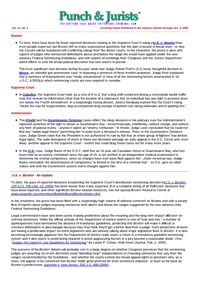This is one of those cases that cried out for relief from an inflexible Guidelines regimen. The defendant, Robert Myers, who had no prior criminal history, was charged by an over-zealous ATF with the unlawful possession of an illegal firearm.
Myers, who lives in rural Iowa, had received a …
Petitioner filed a 28 U.S.C.S. § 2241 petition, claiming that he should have been released from federal detention because he had accrued 121 days of good-time credit pursuant to 18 U.S.C.S. § 3624(b). The Bureau of Prisons (BOP), applying 28 C.F.R. § 523.20's construction of the statute, contended that …
Respondent prison inmate was convicted in state court of murders and sentenced to death but asserted that the statutory aggravating sentencing factor for conduct which was especially heinous, atrocious, or cruel was unconstitutionally vague. Upon the grant of a writ of certiorari, petitioner custodial official appealed the judgment of …
By a 6-to-2 vote, the Supreme Court ruled that police do not violate the Fourth Amendment when they use a drug-detecting dog to locate illegal drugs during a legal traffic stop, even if the officers have no reason to suspect that the motorist may be carrying narcotics.
In a …
As a sign of the times in which we live, Judge Hurd rejected the defendant’s motion to suppress evidence seized in his car that was derived from a Global Positioning System (“GPS”) device that was placed in his car without any warrant. Judge Hurd cited U.S. v. Knotts, 460 …
There are at least three good reasons to read this decision. First, even though Judge Bates was appointed to the bench by President Bush, and even though, as his decision reflects, he is in favor of giving limited right to poor souls held, indefinitely and incommunicado, at the U.S. …
In a case involving the legal rights of some of the "enemy combatants" being held at Guantanamo Bay, Judge Green held that the President is not authorized “to rule by fiat that an entire group of fighters” has limited legal rights.
Khalid v. Bush, 355 F.Supp.2d 311 (D.D.C. …
In a case involving some of the alleged "enemy combatants" being held at Guantanamo Bay, Judge Leon concluded that he could not find any “viable legal theory” permitting him to order such a detainee’s release, despite the Supreme Court's decision in Rasul.
Khalid v. Bush, 355 F.Supp.2d 311 …
Petitioner detainees brought actions against respondents, federal government officials and military officials (officials), regarding their continued detention at a United States military base. Following coordination of the detainees' actions, the officials moved for a protective order.
The officials sought to prevent the unauthorized disclosure or dissemination of classified national …
